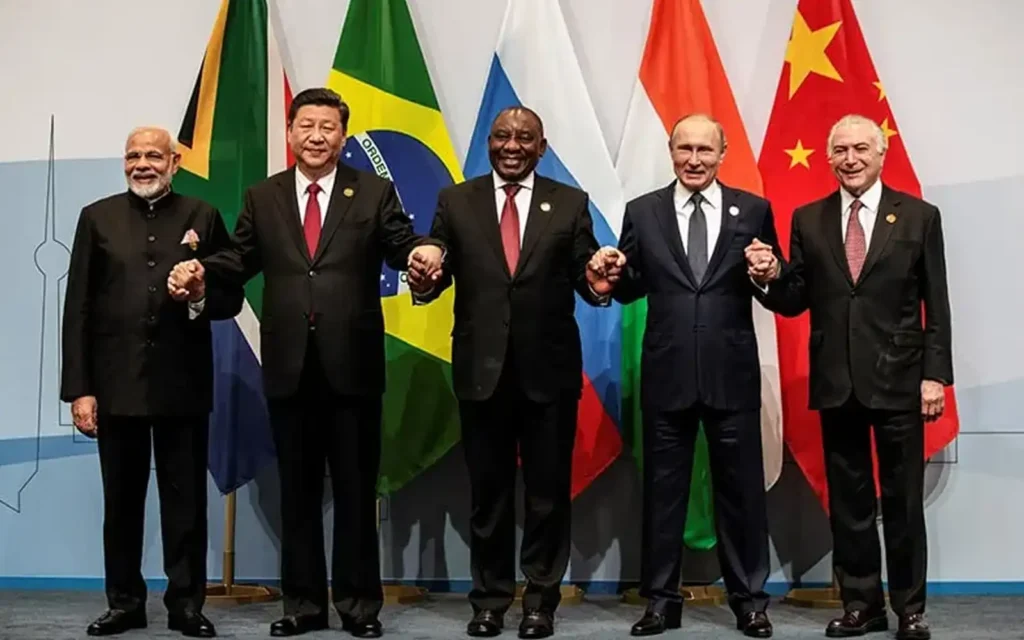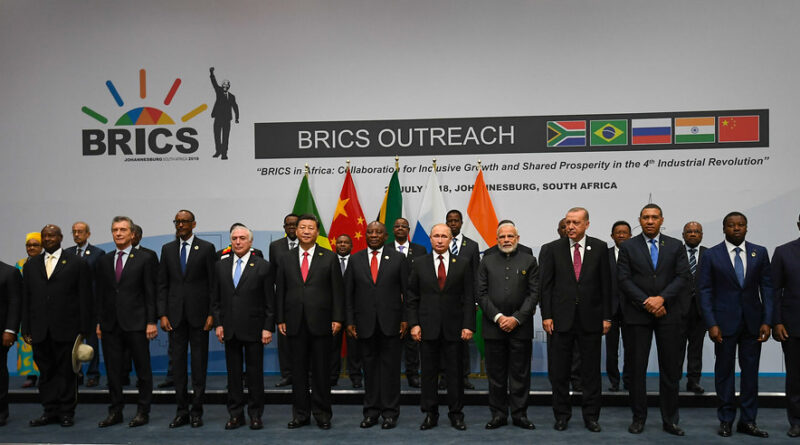Russia to Host 16th BRICS+ Summit: Strengthening Multilateralism in a Changing World
Russia will host the 16th BRICS+ Summit in Kazan from October 22-24, 2024, bringing together the BRICS nations and their partners to focus on economic cooperation, political dialogue, and addressing global challenges like climate change and sustainable development. South Africa previously hosted the 15th BRICS Summit in Johannesburg from August 22-24, 2023, where key goals included promoting economic growth, fostering development, and enhancing cooperation among member countries. The primary aim of this group is to reform global financial and political systems to better reflect the interests of emerging economies.
Origins of BRICS
BRICS, an acronym for Brazil, Russia, India, China, and South Africa, was coined by Goldman Sachs economist Jim O’Neill in 2001 to describe the economic potential of four countries—Brazil, Russia, India, and China (BRIC). O’Neill predicted that these countries could dominate the global economy by 2050. In 2010, South Africa joined, making it BRICS. The group held its first official meeting in 2009 in Russia, where members discussed economic cooperation and the need for global financial reforms.
BRICS, a dynamic alliance of five major emerging economies, does not have a central headquarters like traditional organizations. However, the New Development Bank (NDB), headquartered in Shanghai, China, symbolises the group’s financial strength. The NDB plays a crucial role in funding infrastructure and sustainable development projects in it and other developing nations. This bank embodies BRICS’ commitment to reshaping the global financial landscape.
The NDB’s first president was K.V. Kamath, and the current president is Dilma Rousseff. The BRICS Chairmanship rotates annually, following the sequence of the acronym B-R-I-C. The cooperation within this group is built on three key pillars: political and security collaboration, economic and financial cooperation, and cultural and people-to-people exchanges. The alliance has also developed sectoral cooperation across areas like energy, health, education, science and technology, innovation, trade promotion, and tackling transnational crime. It emphasizes mutual respect, sovereign equality, inclusiveness, consensus, and strengthened collaboration.
Its Significance
The theme for Russia’s BRICS Chairmanship in 2024 is “Strengthening Multilateralism for Just Global Development and Security.” This underscores the group’s commitment to enhancing multilateral cooperation to address global challenges.
BRICS unites five major emerging economies that collectively represent 41% of the global population, 24% of world GDP, and 16% of global trade. As such, it has driven global economic growth and plays a vital role in global governance, covering political, economic, and cultural domains. The group aims to foster cooperation across sectors like trade, finance, agriculture, and technology, providing a platform for nations to coordinate policies on economic development, political issues, and global security.
At its 15th summit in Johannesburg in August 2023, BRICS expanded for the first time in 13 years, welcoming Egypt, Ethiopia, Iran, and the United Arab Emirates. This expansion reflects the group’s growing influence and its aim to increase the voice of emerging economies in global financial institutions like the IMF and World Bank.
BRICS has also emphasized institutional development, including mechanisms for energy trade, international finance, and closer cooperation between banks and tax authorities. These efforts underline its commitment to fostering a more balanced and multipolar global economic order.
Geopolitical Impact and the 2024 Summit
The geopolitical agenda for the 2024 BRICS Summit is crucial for strengthening global influence, fostering economic cooperation, ensuring energy security, and challenging Western dominance. The growing strength of this group, along with its expanded membership, signals a shift in the global balance of power, raising questions about the future of global governance.
A new BRICS currency, which has been a topic of discussion, could strengthen economic integration among its members, reduce global dependence on the US dollar and euro, and weaken the influence of the US in the global economy. However, experts are divided on the feasibility of such a currency, citing economic disparities among member countries and concerns about increasing reliance on the Chinese yuan.
The rise of BRICS and its expanding membership challenge traditional Western-led institutions like the G7. As more countries align themselves with BRICS, a more multipolar world could emerge. Whether this will foster global cooperation or deepen existing divisions remains to be seen. Nonetheless, BRICS is no longer just an economic alliance—it has evolved into a formidable geopolitical force.

Challenges for BRICS in 2024
Despite its growing influence, BRICS faces significant challenges. One of the most prominent is the slowing economic growth across its member countries after decades of rapid development. There are also wide economic disparities among members, particularly between economic giants like China and struggling economies like South Africa and Brazil. These disparities have led to disagreements on trade and investment policies within the group.
Geopolitically, internal tensions, such as the India-China border disputes and the Nile water conflict between Egypt and Ethiopia, complicate BRICS’ efforts to foster cohesive policymaking. Additionally, the group’s ambition to challenge Western dominance in global institutions heightens geopolitical tensions. Addressing complex issues like climate change and technological advancements also requires unified strategies, which may be difficult given differing national priorities.
The Future
The future of BRICS in 2024 holds both opportunities and challenges. The inclusion of new members like Egypt, Ethiopia, Iran, Saudi Arabia, and the UAE expands BRICS’ influence, amplifying the voice of the Global South. This expanded BRICS+ now represents nearly half of the world’s population and a significant share of global trade and GDP, positioning it as a powerful economic bloc.
However, internal divisions and differing economic and political interests among members could hinder BRICS’ ability to act cohesively. Success will depend on their collective efforts to align policies and build their political and financial institutions. India, with its strong diplomatic ties and consensus-building capabilities, is well-positioned to enhance its leadership role in BRICS and the Global South, contributing to a more equitable world order.
For more such interesting blogs, visit: https://vichaardhara.co.in/


